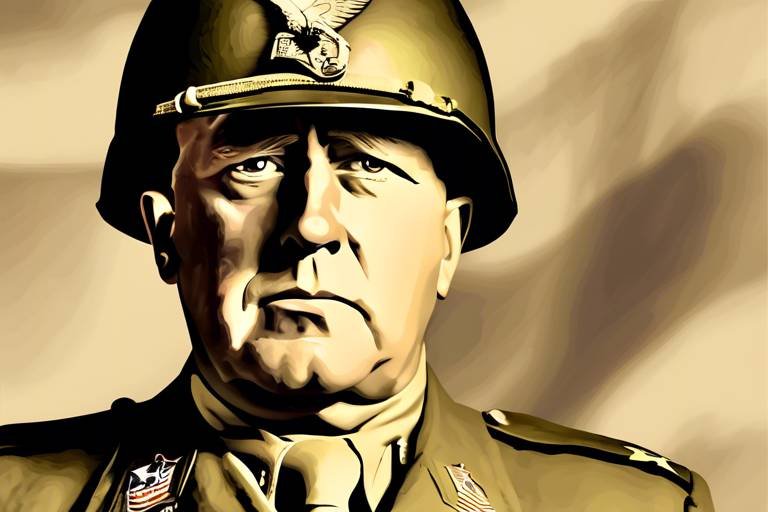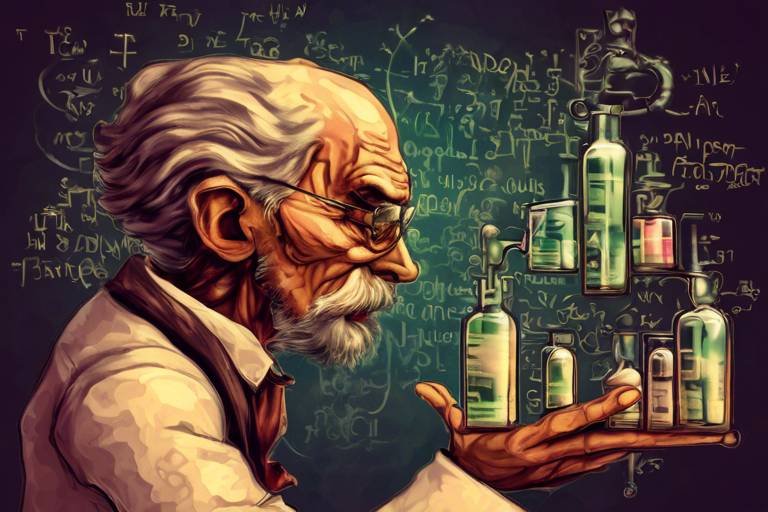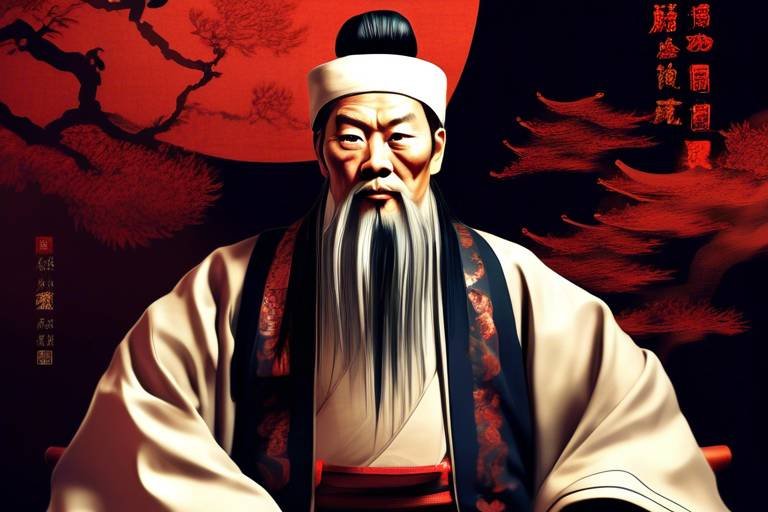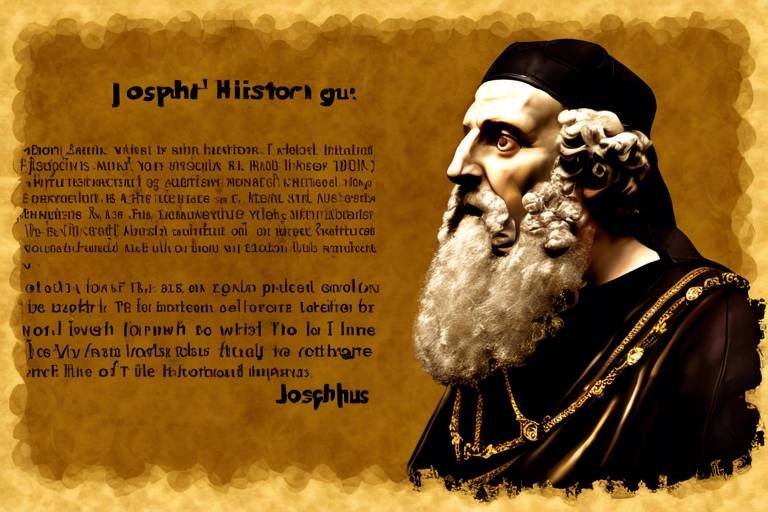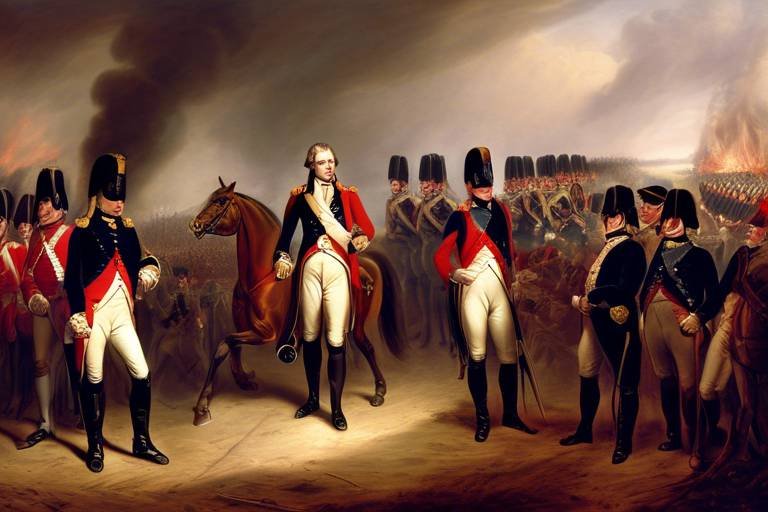Patton: The General Who Led in WWII
General George S. Patton, a name synonymous with courage, strategy, and charisma, emerged as a pivotal figure in the tumultuous theater of World War II. His leadership prowess, marked by audacious tactics and unwavering determination, left an indelible mark on the annals of military history.

Early Life and Military Career
General George S. Patton, the legendary figure in World War II, had a remarkable early life and military career that laid the foundation for his future success on the battlefield. Born into a family with a strong military background, Patton was destined for a life of service. His military education at West Point provided him with the necessary skills and knowledge to excel in his career. Patton's early experiences in the military, including serving in the Pancho Villa Expedition and World War I, shaped his fearless and determined leadership style.
One of the defining moments in Patton's military career was his role in the development of the U.S. Army's armored warfare doctrine. His innovative ideas and strategic thinking revolutionized the way tanks were used in combat, earning him the nickname "Old Blood and Guts." Patton's leadership in the early stages of World War II, particularly in North Africa, showcased his tactical brilliance and aggressive approach to warfare.

Key Battles and Campaigns
During World War II, General George S. Patton played a pivotal role in several key battles and campaigns that shaped the course of the war. One of the most significant campaigns in which Patton was involved was the North African Campaign. Leading the Western Task Force, Patton's strategic brilliance and aggressive tactics were instrumental in the success of the campaign, ultimately driving the Axis forces out of North Africa.
Another notable campaign led by Patton was the invasion of Sicily. Codenamed Operation Husky, this campaign marked the beginning of the Allied invasion of Italy and was a crucial step towards weakening the Axis powers in Europe. Patton's bold and decisive leadership during the Sicily Invasion demonstrated his ability to command troops under challenging circumstances.
However, perhaps the most famous battle associated with General Patton is the Battle of the Bulge. As the German forces launched a massive offensive in the Ardennes region, Patton's Third Army played a crucial role in relieving the besieged town of Bastogne. Through rapid deployment and aggressive tactics, Patton's forces were able to counter the German advance and secure a decisive victory in one of the most critical battles of the war.
Patton's innovative tactics and strategies, such as his emphasis on mobility, surprise attacks, and exploiting enemy weaknesses, were key factors in the success of these battles and campaigns. His ability to inspire and lead his troops with unwavering determination earned him a reputation as one of the most effective military commanders of World War II.

Innovative Tactics and Strategies
Exploring the life and leadership of General George S. Patton, a prominent figure in World War II known for his strategic brilliance, bold tactics, and colorful personality.
Discovering Patton's upbringing, military education, and early experiences that shaped him into the fearless and skilled leader he became during WWII.
Examining Patton's crucial role in significant battles and campaigns, such as the North African Campaign, Sicily Invasion, and the famous Battle of the Bulge.
Detailing Patton's unconventional and effective military strategies, including his emphasis on speed, aggression, and relentless pursuit of the enemy. One of Patton's most innovative tactics was his use of rapid armored advances to surprise and overwhelm enemy forces. He believed in always keeping the enemy off-balance, using unexpected maneuvers and lightning-fast attacks to gain the upper hand. This approach not only confused his opponents but also instilled fear and uncertainty in their ranks, leading to strategic advantages on the battlefield.
Exploring Patton's dynamic interactions with other Allied leaders, including Eisenhower, Montgomery, and Bradley, and how these relationships influenced military decisions.
Addressing the controversies surrounding Patton, such as his outspoken nature, disciplinary issues, and the infamous slapping incidents.
Reflecting on Patton's lasting legacy in military history, his influence on future generations of military leaders, and the lessons learned from his leadership style.
Delving into Patton's personal life, including his family, interests, and personal reflections on war, leadership, and the sacrifices of soldiers.
Examining the tragic end of Patton's life, his contributions to the war effort, and the honors and memorials dedicated to his memory.
Coming soon...

Relationship with Allied Leaders
General George S. Patton, known for his remarkable leadership during World War II, had a complex and intriguing relationship with other Allied leaders. His interactions with key figures such as Eisenhower, Montgomery, and Bradley played a significant role in shaping military decisions and strategies.
Patton's relationship with General Dwight D. Eisenhower, the Supreme Commander of the Allied Expeditionary Force, was one of mutual respect and strategic collaboration. Despite occasional disagreements, the two leaders shared a common goal of defeating the Axis powers and worked closely together to achieve victory.
In contrast, Patton's dynamic with British General Bernard Montgomery was characterized by rivalry and differing military approaches. Montgomery's cautious and methodical style often clashed with Patton's bold and aggressive tactics, leading to tensions and disagreements over the best course of action in various campaigns.
Additionally, Patton's partnership with General Omar Bradley, his fellow American commander, was marked by a deep professional bond and shared vision for success on the battlefield. Bradley served as Patton's superior in some instances, but their relationship was built on trust, camaraderie, and a shared commitment to achieving military objectives.
Throughout the war, Patton's interactions with Allied leaders reflected the complex dynamics of wartime alliances, where individual personalities, strategies, and egos often intersected. Despite the challenges and differences in approach, these relationships ultimately contributed to the overall success of the Allied forces in World War II.

Controversies and Criticisms
General George S. Patton, despite his undeniable military prowess, was not without his share of controversies and criticisms. One of the most notable aspects of Patton's character was his outspoken nature, often leading to clashes with superiors and subordinates alike. His disregard for political correctness and tendency to speak his mind freely earned him both admirers and detractors within the military hierarchy.
Furthermore, Patton's disciplinary issues were a recurring theme throughout his career. His strict and at times harsh leadership style, while effective in achieving results on the battlefield, often rubbed some soldiers the wrong way. Reports of Patton berating and even physically striking soldiers under his command tarnished his reputation and led to questions about his suitability for command.
Perhaps the most infamous incidents involving Patton were the slapping episodes, where he physically struck two soldiers suffering from battle fatigue. While Patton believed he was motivating the soldiers to overcome their psychological struggles, the actions were met with condemnation and sparked public outrage. These incidents not only damaged Patton's image but also raised concerns about his temperament and judgment.
Despite the controversies and criticisms surrounding him, General Patton remained a complex and compelling figure in military history. His unorthodox methods and unapologetic demeanor set him apart from his contemporaries, leaving a lasting impact on the way leadership in the military is perceived and practiced.

Legacy and Impact
Patton's legacy in military history is nothing short of monumental. His impact on the outcome of World War II reverberates through the annals of time, solidifying his place as one of the most revered and controversial figures in military leadership. Patton's strategic brilliance, coupled with his audacious tactics and unwavering determination, set him apart as a true master of warfare.
One of the key aspects of Patton's legacy is his influence on future generations of military leaders. His emphasis on decisive action, rapid maneuvering, and relentless pursuit of victory has become a cornerstone of modern military strategy. The "Patton way" continues to inspire and guide military commanders around the world, showcasing the enduring impact of his leadership style.
Furthermore, Patton's unyielding dedication to his troops and his willingness to lead from the front left an indelible mark on those who served under him. His ability to instill confidence, loyalty, and a sense of purpose in his soldiers contributed significantly to the success of his campaigns. Patton's legacy is not just about victories on the battlefield but also about the profound respect and admiration he earned from those who followed him.
Moreover, Patton's legacy extends beyond the realm of military strategy. His colorful personality, sharp wit, and unapologetic demeanor have made him a legendary figure in popular culture. From books to movies, Patton's larger-than-life persona continues to captivate audiences and serve as a symbol of courage, determination, and leadership.
In conclusion, General George S. Patton's legacy and impact on military history are immeasurable. His strategic genius, bold leadership, and uncompromising dedication to victory have left an enduring mark on the world of warfare. Patton's influence continues to shape the way we think about leadership, strategy, and the relentless pursuit of excellence on the battlefield.

Personal Life and Reflections
General George S. Patton, renowned for his strategic brilliance and bold tactics in World War II, had a multifaceted personal life that often reflected his intense and driven personality. Beyond the battlefield, Patton was a complex individual with a deep sense of duty and passion for military leadership. His personal life and reflections offer a glimpse into the man behind the military legend.
Patton's family life was marked by a strong sense of tradition and duty. His upbringing in a military family instilled in him a deep respect for discipline and honor. Despite the demands of his military career, Patton remained dedicated to his family, finding solace and strength in their unwavering support. His personal letters and diaries reveal a man torn between his duty to his country and his love for his family.
Outside of the battlefield, Patton had a keen interest in history, particularly military history. He was an avid reader and student of past military campaigns, constantly seeking to learn from the successes and failures of past leaders. This intellectual curiosity and thirst for knowledge shaped his strategic thinking and approach to warfare, making him a formidable and innovative military leader.
Patton's personal reflections on war and leadership were often introspective and philosophical. He grappled with the moral and ethical complexities of warfare, questioning the human cost of conflict and the sacrifices made by soldiers under his command. Despite his aggressive and sometimes controversial tactics on the battlefield, Patton was not immune to the emotional toll of war, often expressing deep empathy for the men under his leadership.
In his private moments, Patton was known to be a man of deep conviction and unwavering dedication to his principles. He believed in leading by example and held himself to the same high standards he expected from his troops. His personal code of honor and integrity guided his decisions both on and off the battlefield, earning him the respect and admiration of those who served under him.
As Patton's military career progressed, he became increasingly reflective on the nature of leadership and the legacy he would leave behind. He understood the weight of his actions and the impact they would have on future generations of military leaders. Patton's personal reflections on his role in history reveal a man driven by a sense of duty and a profound commitment to his country.

Final Days and Posthumous Honors
As we delve into the final days and posthumous honors of General George S. Patton, we uncover the tragic end of a legendary military leader. Patton's life was cut short in a car accident in Germany on December 21, 1945, just months after the end of World War II. Despite surviving the perils of war, he met his demise on a quiet road, leaving behind a legacy that would endure for generations.
Following his death, Patton received numerous posthumous honors in recognition of his exceptional leadership and contributions to the Allied victory. The United States government awarded him the Distinguished Service Cross, the second-highest military decoration for valor, for his gallantry in combat. Additionally, Patton was posthumously promoted to the rank of four-star general, a testament to his remarkable achievements on the battlefield.
Memorials dedicated to Patton's memory can be found across the United States and Europe, commemorating his indelible mark on history. The Patton Monument in Luxembourg stands as a symbol of his leadership during the Battle of the Bulge, while the General George S. Patton Museum in California preserves his legacy for future generations. These tributes serve as a reminder of Patton's enduring influence and the sacrifices made by those who served under his command.
Frequently Asked Questions
- What made General Patton a significant figure in World War II?
General Patton stood out in WWII due to his strategic brilliance, bold tactics, and colorful personality. His leadership style and innovative strategies played a crucial role in several key battles and campaigns.
- How did General Patton's relationships with Allied leaders impact his military decisions?
Patton's dynamic interactions with leaders like Eisenhower, Montgomery, and Bradley influenced military strategies and decisions. These relationships shaped the course of important campaigns and battles during the war.
- What controversies surrounded General Patton during his military career?
Patton faced controversies due to his outspoken nature, disciplinary issues, and the infamous incidents where he slapped soldiers. These controversies added layers to his persona and leadership style.
- What was General Patton's lasting legacy in military history?
Patton left a lasting impact on military history through his leadership style, influence on future military leaders, and the lessons learned from his innovative tactics and strategies. His legacy continues to inspire military minds today.

